Nashman Affiliate Faculty
We are proud of our GW faculty across our undergraduate and graduate programs who are part of community-engaged scholarship in their research and practice with students. Their work makes GW a place that centers research that benefits our community and that helps students learn how to make a difference in the world beyond GW.
If you are interested in becoming an Affiliate Faculty member with the Nashman Center please contact gwserves gwu [dot] edu or Wendy Wagner at wagnerw
gwu [dot] edu or Wendy Wagner at wagnerw gwu [dot] edu.
gwu [dot] edu.
Nashman Affiliate Faculty by School
Columbian College of Arts and Sciences
- Dr. Greg Squires
Dr. Greg Squires

Professor Emeritus of Sociology and Public Policy and Public Administration
Sociology, Trachtenberg School of Public Policy & Public Administration
Gregory D. Squires is a Research Professor and Professor Emeritus in the Department of Sociology at George Washington University. Currently, he is a member of the Fair Housing Task Force of the Leadership Conference on Civil and Human Rights and the Social Science Advisory Board of the Poverty & Race Research Action Council. He has served as a consultant and expert witness for fair housing groups and civil rights organizations around the country including HUD, the National Fair Housing Alliance, the National Community Reinvestment Coalition, and many others. He also served a three-year term as a member of the Consumer Advisory Council of the Federal Reserve Board and as a Consumer Funded Representative to the National Association of Insurance Commissioners as well as a member of the Wisconsin and DC Advisory Committees to the U.S. Commission on Civil Rights. He has testified before Congress as well as state and local legislative committees on a variety of civil rights issues. In 2012 he served as Chair of the Governing Board of the Urban Affairs Association. Editorial board memberships have included City & Community, Social Problems, Journal of Urban Affairs, Journal of Intergroup Relations (where he served as editor for three years), and Shelterforce. In 2022 he was appointed as a community development columnist for Social Policy a quarterly magazine on “Organizing for Social & Economic Justice.”
- Dr. Hiromi Ishizawa
Dr. Hiromi Ishizawa

Associate Professor of Sociology
Sociology
After graduating from the University of Illinois at Urbana-Champaign, Professor Ishizawa spent two years as a post-doctoral research associate at the Minnesota Population Center (MPC) at the University of Minnesota. Her research interests are in the areas of social and family demography, immigration, sociology of language, and urban sociology. Her research focuses on the understanding of how immigrants integrate into American society. In particular, her work emphasizes the influence of context, such as family and neighborhood, on the process of integration. She has published work that examines many aspects of immigrant integration, including minority language maintenance, civic participation, health, sequence of migration within family units, intermarriage, and residential settlement patterns among minority language speakers. In addition, she conducts research on another immigrant destination country, New Zealand. Her work focuses on residential segregation and patterns of ethnic neighborhoods among recent immigrant groups and the indigenous Maori population. Additionally, her research project examines life satisfaction among immigrants in Japan.
- Dr. Phyllis Ryder
Dr. Phyllis Ryder

Deputy Director of the Writing Center, Associate Professor of Writing
University Writing Program
Through both scholarship and teaching, Phyllis Ryder investigates what it means to write for social change, focusing particularly on what mindsets and material conditions are necessary for truly transformative university-community partnerships. She collaborates with DC nonprofit leaders, former students, and librarians on much of her research. Her 2011 book, Rhetorics for Community Action, offers a theory for conceptualizing public writing in democracy as well as practical guidance for developing first-year writing classes with a service-learning focus. Her work has been published in Rhetoric Review, JAC, Reflections, and Community Literacy Journal, among others.
- Dr. Imani Cheers
Dr. Imani Cheers
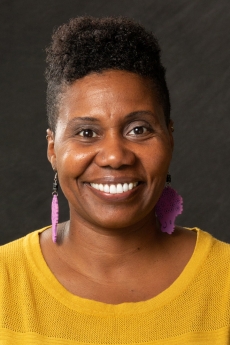
Associate Professor of Media and Public Affairs
Media and Public Affairs
Imani M. Cheers is an associate professor of digital storytelling and the Interim Senior Associate Provost for the Undergraduate Education Office of the Provost. She is also the Director of Academic Adventures for Planet Forward. Dr. Cheers received her B.F.A from Washington University in St. Louis an M.A. in African Studies and a Ph.D. in mass communication and media studies from Howard University. Dr. Cheers is an award-winning digital storyteller, director, producer, and filmmaker. As a professor of practice, she uses a variety of mediums including video, photography, television, and film to document and discuss issues impacting and involving people of the African Diaspora. Her scholarly focus is on the intersection of women/girls, technology, health, conflict, agriculture, and the effects of climate change in sub-Saharan Africa. Dr. Cheers is also an expert on diversity in Hollywood, specifically the representation of Black women in television and film. She is the author of The Evolution of Black Women in Television: Mammies, Matriarchs, and Mistresses (Routledge/Taylor & Francis, 2017). Her work has been supported by the Ford Foundation and the International Reporting Project. Dr. Cheers is also a regular contributor to international outlets including BBC, CGTN America, and CTN Canada, offering insight into American race relations and popular culture. In 2017, she was awarded GW’s Graduate Mentoring Award and in 2019 the Staub Excellence in Teaching Award.
- Dr. Jamesta Barlow
Dr. Jameta Barlow

Assistant Professor of Writing and Health Policy Management
Undergraduate Advisor for the Women, Gender, and Sexuality; Assistant Professor of Writing and Health Policy Management
Jameta Nicole Barlow, PhD, MPH, a Charlottesville, Virginia native, is a community health psychologist and an assistant professor of writing at The George Washington University in Washington, DC. Dr. Barlow utilizes decolonizing methodologies to disrupt intergenerational trauma, chronic health diseases, and structural policies adversely affecting Black girls' and women's health. She has spent nearly 22 years in transdisciplinary collaborations with physicians, public health practitioners, researchers, policy administrators, activists, political appointees, and community members in diverse settings. Dr. Barlow holds a Bachelor of Arts (BA) in English from Spelman College, a Master of Public Health (MPH) in Maternal and Child Health from George Washington University, and a Doctor of Philosophy (PhD) in Psychology from North Carolina State University. Certified as an Emotional Emancipation Circle Facilitator, Dr. Barlow is a 2015 AcademyHealth/Aetna Foundation Scholar in Residence Fellow and a 2016 RAND Faculty Leaders Fellow in Policy Research and Analysis. Her writings on Black girls and women's health, intersectionality, and restorative health practices in psychology and public health research appear in various publications. Her most recent work, the Saving Our Sisters Project (www.savingoursistersproject.com), is focused on Black women's mental health and well-being.
- Dr. Jordan Potash
Dr. Jordan Potash

Associate Professor of Art Therapy
Art Therapy
Jordan S. Potash, Ph.D., ATR-BC, REAT, LPCAT (MD) is a registered, board-certified, and licensed art therapist, as well as, a registered expressive arts therapist. He has worked with clients of all ages in schools, clinics, and community art studios in the U.S. and Hong Kong. Jordan is primarily interested in the applications of art and art therapy in community development and social change, with an emphasis on reducing stigma, confronting discrimination, and promoting cross-cultural relationships. He also advocates for a broad approach to art therapy that increases client access to services by focusing on therapy, prevention, and wellness applications. Jordan is an active member of the American Art Therapy Association; he is the current Editor in Chief of Art Therapy: Journal of the American Art Therapy Association and past chairperson of both the Multicultural and Ethics Committee. While living in Hong Kong for 8 years, Jordan co-founded the Masters of Expressive Arts Therapy at The University of Hong Kong, the first degree of its kind in Asia. In addition, he taught and led workshops in China, Thailand, Korea, and Israel.
- Dr. Manuel Cuellar
Dr. Manuel Cuellar

Associate Professor of Spanish and Latin American Literatures and Cultures
Romance, German & Slavic Languages
Manuel R. Cuellar focuses on Mexican literary and cultural studies with an emphasis on race, gender, and sexuality. He holds a Ph.D. in Hispanic Languages and Literatures from the University of California, Berkeley. His research engages questions of performance, especially as they concern dance, indigeneity, and Afro-mestizo imaginaries in Mexico, combining ethnographic fieldwork, archival research, and studies of contemporary and classical Nahuatl, Mexico’s most widely spoken and written Indigenous language. Another area of related interest, reflected explicitly in his teaching and ongoing research, is US Latina/o/x Studies with a focus on community-engaged learning.
- Dr. Michele Kelso
Dr. Michelle Kelso
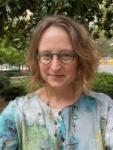
Assistant Professor of Sociology and International Affairs
Sociology: Human Services and Social Justice
Professor Kelso’s research focuses primarily on the fate of the Roma during the Holocaust in Romania. Social justice and the exploration of (in)equalities are the foundations of her research. She is particularly interested in the intersection of memory, marginalization, and contemporary education policy. Recently, Dr. Kelso has also begun exploring gender in the workplace as well as EU migration. With a strong belief in public sociology, Dr. Kelso integrates her scholarship with public discussions and policy programming. In 2017, she began a research project focusing on memory and commemoration of the Holocaust in post-Soviet spaces with a concentration on Ukraine. Dr. Kelso has extensive international experience both as a researcher and consultant. She consulted for the Council of Europe, USAID, non-profits, Holocaust compensation programs, as well as the Romanian government. She has been the recipient of several prestigious national awards, including a Fulbright Core Fellowship to Romania in 2016-17, and two prior Fulbrights in 2004 and 1994. Dr. Kelso was a Charles H. Revson Foundation Fellow at the U.S. Holocaust Memorial Museum in 2009, where she researched the Romani experience in Romanian-run camps in the occupied Soviet Union during WWII. She speaks Romanian and French, and has studied Romani, Spanish, and is beginning Russian.
- Dr. Tara Scully
Dr. Tara Scully

Director of the Sustainability Minor Degree Program; Co-Director of Sustainability Initiatives; Teaching Associate Professor of Biological Sciences
Biological Sciences
Tara A. Scully is the Director of the Sustainability Minor Program and an Assistant Professor of Biology at the George Washington University. At GW, she regularly teaches introductory biology and sustainability courses and laboratories to non-science majors. She teaches seven different courses, four in biology for non-science majors which are lab and service-based, and three signature courses in the sustainability program. The Biology of Nutrition and Health; The Ecology and Evolution of Organisms; Food, Nutrition, and Service; Understanding Organisms through Service Learning; Introduction to Sustainability; Culminating Experience in Sustainability, and World on a Plate by Chef José Andrés. Dr. Scully received her MS, specializing in forensic science research with a concentration on fiber evidence, and a Ph.D. with a research focus on developmental biology from George Washington University. She has authored many research articles along with the book: Discovering Biology in the Lab: An Introductory Laboratory Manual as well as Why We Eat Food. Dr. Scully works with many different DMV area community partners on topics ranging from nutrition to invasive species. Her service and instructional work have resulted in her being awarded the university-wide Faculty Engagement Award 2016 from the Honey W. Nashman Center for Civic Engagement and Public Service and the 2019 Morton Bender Teaching Award.
Corcoran
- Anna Kimmel
Anna Kimmel

Dance
Anna Jayne Kimmel is a performance studies scholar invested in the intersection of legal humanities and dance studies, with particular attention to francophone histories and moments of public assembly. As a dancer, Kimmel has performed the works of Ohad Naharin, Trisha Brown, John Jasperse, Francesca Harper, Olivier Tarpaga, and Susan Marshall, amongst others. In 2019, she devised SOLI, an evening-length dance that centered on experiences from death row and remains committed to decarceral efforts. Kimmel holds a Ph.D. in Performance Studies from Stanford University in Performance Studies, with minors in Anthropology and Comparative Studies in Race and Ethnicity. Her scholarship appears in Dance Research Journal, Performance Research, Lateral, The Drama Review (TDR), and The Brooklyn Rail, as well as various edited volumes. She serves on the board of Performance Studies International and is an Associate Editor for Performance Research.
- Jodi Kanter
Jodi Kanter

Professor of Theatre
Theatre & Dance
As a scholar, Jodi has been trained to apply the theoretical lens of performance to everyday practices and so, while her methodology is consistent, the subjects of her work vary wildly—from, for example, end-of-life health care to contemporary dramatic literature to the American Presidency. As an artist, her focus is on strengthening communities through theatrical improvisation, oral history collection, writing, and performance. To this end, over the last twenty-five years, she has created dozens of workshops and performances in a wide variety of settings, including prisons, hospices, libraries, and community centers. She is a trained facilitator of Augusto Boal’s Theatre of the Oppressed.
- Leslie Jacobson
Leslie Jacobson
Professor Emerita of Theatre and Dance
Department of Theatre and Dance
Leslie Jacobson is the Founding Artistic Director of Horizons Theatre, established in 1977, and the “longest-running” women’s theatre still producing in the U.S. Under her leadership, Horizons has introduced Washington audiences to over 60 new plays and playwrights through fully staged productions, and another 50 through public staged readings over the years. The Women’s Committee of the Dramatists Guild gave Horizons a special award for its outstanding work in producing plays by women playwrights. Jacobson has written and produced over a dozen of her own scripts at Horizons and around the country over the years. She graduated cum laude with a degree in Theatre, from Northwestern University; and with a Master of Fine Arts in Directing from Boston University’s School for the Arts. Jacobson served as Chair of the Department of Theatre and Dance at The George Washington University for 13 years, from 1995 to 2008. As Chair, she inaugurated a Women’s Leadership Program in Women and International Culture, located on the Mount Vernon Campus of GW, for Freshmen interested in discovering the ways that women create art differently from men.
Milken Institute of School of Public Health
- Dr. James Peterson
Dr. James Peterson

Assistant Research Professor
Epidemiology
Dr. James Peterson is a dedicated researcher, educator, and advocate at the forefront of HIV/AIDS studies and public health initiatives. With a profound commitment to understanding the intricacies of HIV transmission, prevention, and care, Dr. Peterson's work encompasses a broad spectrum of activities aimed at making meaningful contributions to the field. As an accomplished ethnographic researcher, Dr. Peterson's expertise lies in conducting formative assessments for the National HIV Behavioral Surveillance, providing coordination for the DC Cohort Study, and offering invaluable ethnographic support for key studies within the HIV Prevention Trial Network (HPTN). His focus on understanding the House/Ball scene and the complexities of accessing HIV/AIDS care among young men of color who have sex with men showcases a deep understanding of the diverse contexts influencing health outcomes. Beyond research, Dr. Peterson is a respected educator, sharing his expertise as a faculty member teaching Ethnographic Methods as Applied in Public Health at the George Washington University School of Public Health and Health Services. His commitment to fostering the next generation of public health professionals reflects his passion for knowledge dissemination and skill development.
- Dr. Karina Lora
Dr. Karina Lora

Teaching Assistant Professor of Exercise and Nutrition Sciences
Prevention and Community Health
Karina R. Lora, Ph.D., R.D. joined the Department of Exercise and Nutrition Sciences at George Washington University in August of 2018. Dr. Lora is a community/public health nutritionist with a long-standing record of working with underserved multicultural populations. Dr. Lora's research focuses broadly on childhood obesity prevention in minority populations. One of Dr. Lora’s research goals is to understand the individual, behavioral, and home environmental factors that influence the dietary patterns of family members to develop and implement interventions that are culturally relevant for success. Dr. Lora has a strong interest in integrating teaching and research to provide students with pedagogical approaches that enhance their learning outcomes, cultural competence skills, and awareness of social issues while benefiting communities by evaluating community/public health programs to improve their delivery and impact.
- Dr. Mark Edberg
Dr. Mark Edberg

Professor of Prevention and Community Health
Prevention and Community Health
Dr. Edberg is currently principal investigator (PI) for two research grants from the National Institute on Minority Health and Health Disparities (NIMHD, an NIH institute): Development, implementation, and evaluation of a novel youth firearms violence prevention effort in collaboration with a community in Ward 8 of the District of Columbia, and a qualitative-to-quantitative effort to develop an instrument measuring indigenous historical trauma and its potential effects on health disparities among American Indian/Alaska Native communities. The latter project is a collaboration with the Eastern Band of Cherokee Indians and Western Carolina University. He also directs the Avance Center for the Advancement of Immigrant/Refugee Health (Avance Center), an exploratory research center on health disparities that has received funding from NIMHD, the Centers for Disease Control and Prevention (CDC), and the National Heart, Lung and Blood Institute (NHLBI) for research efforts focusing on the co-occurrence of substance abuse, youth violence, the prevention of obesity, and most recently on community engagement approaches to address COVID-19 disparities – all in collaboration with DC metro area Latino immigrant communities. He is also the founder and director of the Center on Social Well-Being and Development (CSWD), under which there is currently a contract for social/behavior change communications services with the World Food Program (WFP) and a history of projects with UNICEF in Belize, Ghana, Indonesia, South Africa, and Jamaica, as well as research on transnational social determinants of health affecting recent Latino immigrants.
- Dr. Sara Wilensky
Dr. Sara Wilensky

Special Service Faculty for Undergraduate Education
PubH: Health Policy and Health Management
Dr. Wilensky focuses on financing, access, and healthcare needs of the medically underserved, with an emphasis on issues relating to Medicaid. After completing her undergraduate work, Dr. Wilensky served as a fellow at Plan de Salud del Valle Community Health Center, located in rural Colorado, gaining first-hand insights into the needs of these populations. Subsequently, she pursued a law degree, clerked for a federal judge, and worked briefly at a law firm, before becoming a member of the GW health policy faculty in 2002. Dr. Wilensky has taught in both the undergraduate and graduate public health programs and has co-authored a textbook, Essentials of Health Policy and Law, which is used at both levels study. Dr. Wilensky currently serves on two Department committees – Curriculum and Faculty and Staff Affairs -- and on the School's SPH Curriculum Committee, BSPH Curriculum Committee, and Undergraduate Planning and Practice Committee. She also participates in the GW committee for Undergraduate Deans and the Faculty Senate University and Urban Affairs Committee.
- Dr. Sean Cleary
Dr. Sean Cleary

Associate Professor of Epidemiology
Epidemiology and Biostatistics
Sean D. Cleary is an Associate Professor of Epidemiology at the Milken Institute School of Public Health.Dr. Cleary's most recent projects focus on health outcomes among autistic adults including Baseline survey of ID/DD adults by housing status and 4 Engaging Autistic Voices in Education and Research (4EAVER): Creating a partnership with a community of autistic adults, with a goal to engage, train and employ autistic adults co-researchers in research endeavors relevant to the autistic community.
- Dr. Tamara Taggert
Dr. Tamara Taggert

Assistant Professor of Prevention and Community Health
Prevention & Community Health
Dr. Tamara Taggart conducts socioepidemiologic studies to examine the social-structural (e.g., structural racism, intersectional stigma, and neighborhoods) and cultural identity factors that influence health behaviors and then uses CBPR approaches to develop and implement interventions to improve HIV-related outcomes and reduce substance use/abuse among racial/ethnic minority and socioeconomically disadvantaged adolescents and emerging adults. Her current work focuses on three areas: (1) Applying a community-engaged framework to examine systems-level factors associated with HIV prevention and treatment; (2) Utilizing activity space assessments and biopsychosocial models of stress to examine the mechanisms connecting discriminatory neighborhood environments and HIV-related behaviors; and (3) Investigating the role of religion, spirituality, and religious institutions on HIV syndemics. Integrating techniques, theories, and concepts from epidemiology, psychology, and sociology, the ultimate goal of Dr. Taggart's program of research is to reduce health disparities and improve the health of adolescents and adults.
- Dr. Uri Colon-Ramos
Dr. Uri Colon-Ramos

Assistant Professor of Global Health and of Exercise and Nutrition Sciences
Milken Institute School of Public Health
Dr. Uriyoán Colón-Ramos is an investigator in public health nutrition globally, with expertise in Latin America, the Caribbean, and the United States. Dr. Colón-Ramos’ research interests are driven by the lived and learned experiences of individuals from underserved communities who have seen their loved ones suffer from diet-related health conditions. This work seeks to make health-promoting behaviors the easy choice so that we can eventually decrease diet-related health disparities. The work from the interdisciplinary teams that she leads has won the Research Into Action Award (New Connections Program, Robert Wood Johnson Foundation); the Faculty Research Excellence Award (Honey W. Nashman Center for Civic Engagement and Service), and is supported by programs in private foundations as well as federal agencies such as the National Science Foundation, the Centers for Disease Control and Prevention, and the National Institutes of Health). Dr. Colón-Ramos was born and raised in Puerto Rico; is trilingual (French, Spanish, English) and a proud member of the 2004 cohort of emerging leaders in nutrition in Latin America (LiLANut).
- Sandy Hoar
Sandy Hoar

Visiting Scholar
PubH: ISCOPES
Sandy Hoar's academic Interests include pragmatic public health and appropriate technology, infectious disease and tropical medicine, cultural competency and community-oriented and community-based primary care (COPC, CBPHC), community-based participatory research (CBPR), and community-campus partnerships, service learning, and working with children as change agents. Current community-engaged activities include being a University Coach with the Interdisciplinary Student Community-Oriented Prevention Enhancement Service (ISCOPES), the Community-Based Primary Health Care (CBPHC) workshop planning committee with the American Public Health Association, including supervising a student abstract and breakout session, supporting Mission to Heal (providing surgical operations and training around the world), board member for Health Improvement and Promotion Alliance, HIP-Ghana, and a just completed white paper on the appropriate response to limited-English proficiency patients in an outpatient clinic.
School of Business
- Dr. Anna Helm
Dr. Anna Helm

Director of the GW Center IB Edu. and Research (GW-CIBER), Teaching Associate Professor of International Business Administration
Management
Anna Helm is a teaching associate professor of international business at the George Washington University School of Business (GWSB) as well as the faculty director of GW’s Center for International Business Education & Research (GW-CIBER). She teaches courses on international marketing management, green business, the cultural environment of international business, and foreign market analysis. Dr. Helm has developed and taught several online courses and regularly offers courses with real-client projects. Since 2010, she has taught international consulting courses in Sweden and other countries with projects in both the cleantech and healthcare industries, with a particular focus on high-tech startups. Her devotion to teaching, student-centered learning, and interdisciplinary collaboration have resulted in numerous teaching awards, including the 2019 inaugural GW School of Business Dean’s Award for Teaching Excellence, and most recently GW’s university-wide Morton A. Bender Teaching Award in 2020.
Graduate School of Education and Human Development
- Dr. Julia Storberg
Dr. Julia Storberg
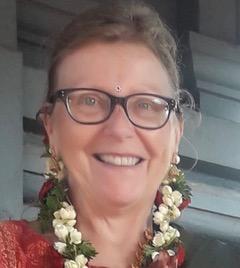
Department Chair of HOL; Associate Professor of Human and Organizational Learning
Sociology, Trachtenberg School of Public Policy & Public Administration
Julia Storberg-Walker is Chair of the Human and Organizational Learning Department, Program Director of the Organizational Leadership and Learning Program, and an Associate Professor in the Department of Human and Organizational Learning at the Graduate School of Education and Human Development. After serving in various leadership capacities at Deloitte & Touche and Deloitte Consulting (1985-1999), she shifted to the non-profit sector and received her PhD in Work, Community, and Family Education from the University of Minnesota in 2004. She has been recognized for her critically informed teaching, research, and activism/service as the recipient of multiple awards including the R. Wayne Pace Book of the Year Award by the Academy of Human Resource Development (2019), the Laura Bierema Critical HRD Award (also from the Academy of Human Resource Development) in 2017; and the Outstanding Research Award from the International Leadership Association (2015). Currently, Julia’s activist/scholar work is generative and aims to develop equitable and compassionate frameworks, models, and processes to catalyze the whole planet's interdependence and flourishing. This work is transdisciplinary and grounded in contemporary philosophical perspectives including posthumanism, new materialism, quantum field theory, and wisdom traditions spanning diverse cultures and historical moments.
- Dr. Sarah M. Ray
Dr. Sarah M. Ray
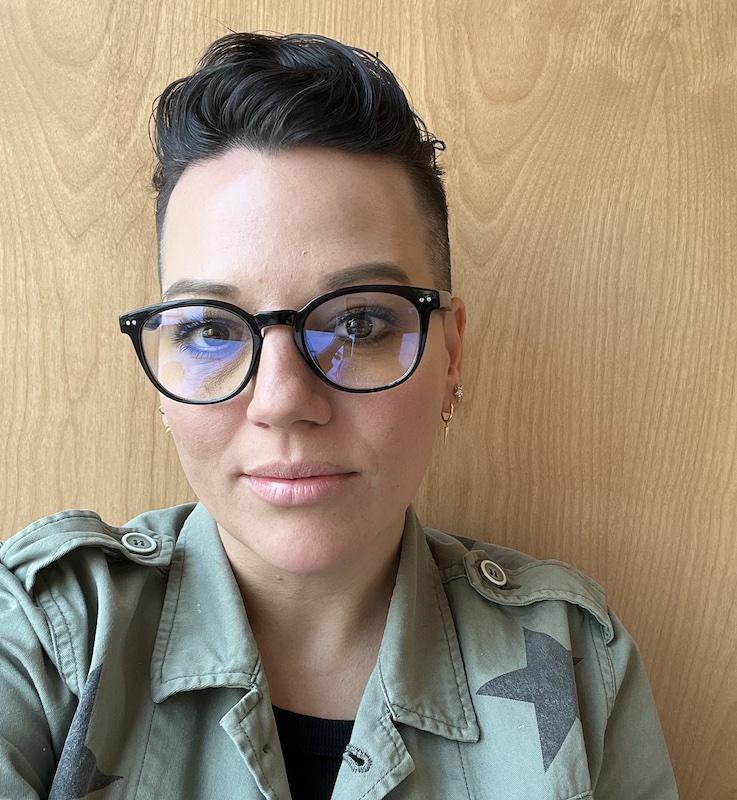
Associate Professor of Human and Organizational Learning
Sociology, Trachtenberg School of Public Policy & Public Administration
Sarah M. Ray, Ph.D. is an Assistant Professor of Human and Organizational Learning in the Graduate School of Education and Human Development at George Washington University. Dr. Ray engages in critical participatory action research and studies social movement learning with women, femme, and non-binary entrepreneur collectives in DC. Learn more.Dr. Ray is currently engaged in critical participatory action research in adult education, and social movement learning with women, femme, and non-binary entrepreneur collectives in the DC area. Recent publications include:- Ray, S.M., Wagner, W., & Bagby, L. (In Press) Democratic Civic Engagement in Occupational Therapy. Adult Learning.
- Ray, S. M., Hinshaw, J., Trivedi, C., Malhotra, G. (Accepted). Supporting WFN Collective Social Entrepreneurship Through Social Movement Learning and Critical Participatory Action Research. Special Issue On Social Entrepreneurship For New Horizons In Adult Education And Human Resource Development.
- Trivedi, C. & Ray, S.M. (Accepted). Career Development, Social Development (SD), and Social Entrepreneurship for Formerly Incarcerated Individuals. Special Issue On Social Entrepreneurship For New Horizons In Adult Education And Human Resource Development.
School of Media and Public Affairs
- Imani Cheers
Imani Cheers

Assistant Professor in the School of Media and Public Affairs
A former DC Rape Crisis Center community organizer, Dr. Cheers spent the last two decades working with vulnerable populations in the U.S. and sub-Saharan Africa. Specifically, she worked on issues impacting women and girls and the intersection of technology, conflict resolution, climate change, and maternal health. As a scholar, her research explores the representation of black women in Hollywood and currently, I'm working on examining the creation, implementation, and impact of Apartheid in South Africa, Namibia, and Palestine.
- Steven Roberts
Steven Roberts
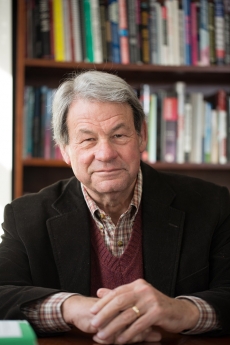
J.B. and Maurice C. Shapiro Professor of Media and Public Affairs
J.B. and Maurice C. Shapiro Professor of Media and Public Affairs
Community involvement has been a major part of Professor Robert’s life as a GW professor. He writes a regular column for Bethesda Magazine that focuses on people making a difference in Montgomery County. One recent column told the story of Rosa Linares, an immigrant from El Salvador who grows crops from her native country on a lot next to her house and sells them to other Central American immigrants at a farmers’ market in Takoma Park. He serves on the board of the Montgomery County Historical Society, Montgomery Hospice, and Bread for the City, a vast social service organization centered in Washington D.C. He maintains a network of hundreds of his former students
School of Medicine and Health Sciences
- Dr. Erin Wentzell
Dr. Erin Wentzell

Academic Director, Pediatric Residency; Assistant Professor of Health, Human Function, and Rehabilitation Sciences
Physical Therapy and Health Sciences
Erin Wentzell is a practicing pediatric physical therapist who has worked in both acute care and outpatient settings. In 2010 Dr. Wentzell purchased her own practice where she provides in-home early intervention therapy Dr. Wentzell purchased her own practice where she provides in-home early intervention therapy for children throughout Washington D.C. Her practice serves primarily infants and young toddlers with a focus on parent education and family empowerment to increase activity and physical play from an early age. Dr. Wentzell earned a Specialist Certification in Pediatrics (PCS) from the Board of Physical Therapy Specialties in 2012. She is active in the APTA and Pediatrics Section as well as the International Organization of Physical Therapists in Pediatrics. Dr. Wentzell teaches in the Foundations of Interventions and Pediatrics courses. In addition, she organizes and runs the Inter-Professional Community Practicum course. Her areas of interest are physical activity and exercise promotion for children with special needs as well as obesity prevention in special needs populations.
- Dr. Howard Straker
Dr. Howard Straker

Director, Physician Assistant/MPH Program; Associate Professor of Physician Assistant Studies & Prevention and Comm Health
Sociology, Trachtenberg School of Public Policy & Public Administration
Howard Straker has more than 30 years of PA educational and clinical experience and is an assistant professor in the Physician Assistant Program. Straker serves as director of the Physician Assistant MPH Program, coordinating the joint degree curriculum across the Physician Assistant Program and four departments within the Milken Institute School of Public Health. He teaches in both the Department of Physician Assistant Studies and the Department of Prevention & Community Health. Straker’s interests are in the preparation of practitioners to work in underserved communities, diversity and inclusion, health professions workforce, and blended learning pedagogy. He currently serves on the Physician Assistant Education Association (PAEA) Board of Directors as president-elect.
- Dr. Lalit Narayan
Dr. Lalit Narayan

Assistant Professor of Medicine
Physician Assistant Program, Prevention and Community Health (Secondary)
Lalit Narayan, MBBS, MA, is an Assistant Professor of Medicine at the George Washington University School of Medicine & Health Sciences. He received his medical degree from St. John's Medical College, Bangalore, India in 2007. He subsequently worked as a general practitioner in rural India for two years before moving to the US to pursue further education. He earned a Master's Degree in Anthropology at Syracuse University, New York in 2013, completed his Residency in Primary Care/Social Internal Medicine at Montefiore Medical Center, New York in 2016, and completed an Academic Fellowship in Medical Education at George Washington University in 2017. Dr. Narayan strongly believes in a holistic assessment of medical problems using a bio-psycho-social approach. He is passionate about social medicine, a school of thought within modern medicine that plays close attention to the historical, social, environmental, and epidemiological context in which ill health arises and seeks to meet patients 'where they are at' to work together on their health. His clinical interests center around the provision of comprehensive primary health care. This includes clinic-based management of acute and chronic medical conditions, screening and reduction of risks to physical and mental health, women's health and the care of medically vulnerable populations.
- Dr. Maranda Ward
Dr. Maranda Ward

Visiting Assistant Professor in Clinical Research and Leadership
Med and Health Science: Clinical Research and Leadership
Dr. Maranda C. Ward is an Assistant Professor and Director of Equity in the Department of Clinical Research and Leadership in the GW School of Medicine and Health Sciences. In this role, she designs, evaluates, and teaches health equity curriculum for student and faculty learners. Her teaching excellence was recognized with the highest teaching honor at GW- the 2021 Morton A. Bender Teaching Award. When asked, she describes herself as a community educator, curriculum developer, and youth builder. She has strong commitments to service-learning, equity, community legacy, youth development, and honoring youth voices. Maranda earned the 2023 GW Black Alumni Impact Award, the 2022 Justice, Equity, Diversity, Inclusion & Community Engagement Award by Transform Mid-Atlantic, the 2020-2021 GW School of Medicine and Health Sciences Diversity and Inclusion Award as well as the 2021 Stigma Warrior Award during the 12th Annual International Conference on Stigma at Howard University for going above and beyond in her field to fight discrimination among historically marginalized populations. She has been consulted by Ebony.com, Rolling Out Magazine, DCist, and the Washington Post for her research on HIV disparities and featured on a live segment of Good Morning Washington, NPR’s Morning Edition, and the KevinMD podcast for her health equity expertise.
- Dr. Susan LeLacheur
Dr. Susan LeLacheur

Professor of Physician Assistant Studies
Physician Assistant Program
Susan LeLacheur is a professor in the Department of Physician Assistant Studies at the George Washington University School of Medicine and Health Sciences. Dr. LeLacheur is a Distinguished Fellow in the American Academy of Physician Assistants (AAPA). She has more than 35 years of clinical experience in primary care, HIV/AIDS, and infectious disease. She is certified as an HIV Specialist by the American Academy of HIV Medicine and is among the founding members of the Physician Assistant AIDS Network of the American Academy of Physician Assistants. Her ongoing clinical practice at Whitman Walker Health in Washington, D.C., includes both primary and HIV care. Dr. LeLacheur’s research interest is in behavioral aspects of patient care and the reduction of bias and stereotyping in the clinical encounter. She has written and presented widely on infectious disease topics, health disparities, bias and stereotyping, and patient-provider interaction. She has served in leadership roles in multiple professional organizations, including the Physician Assistant Education Association and the American Academy of Physician Assistants. LeLacheur also serves as a peer reviewer for several professional publications, including JAAPA, Journal of the American Academy of Physician Assistants, Journal of Physician Assistant Education, Clinician Review, and Clinical Advisor. Dr. LeLacheur’s career has been devoted to providing high-quality patient-centered care to people from disenfranchised populations, improving primary care for people with HIV, and educating and inspiring the next generation of PAs to do likewise in all areas of clinical practice.
School of Nursing
- Sherrie Wallington
Sherrie Wallington

Assistant Professor of Nursing
Nursing
Sherrie Flynt Wallington is an associate professor (tenured) and health disparities researcher specializing in oncology in the Policy, Populations, and Systems department. Dr. Wallington teaches and conducts research on health communication, social determinants of health, and community-based participatory research strategies that focus on prevention, health disparities, and clinical trial recruitment and engagement. She has a particular interest in cancer, particularly prostate, breast, and HPV-associated cancers. The American Cancer Society, the Robert Woods Johnson Foundation, the National Institutes of Health (NIH), and the National Cancer Institute support her research. She has authored several peer-reviewed publications and serves as a scientific grant reviewer for the NIH and other national foundations. In addition, she is a program evaluator and consultant on NIH-funded, governmental, and foundation grant awards.




























